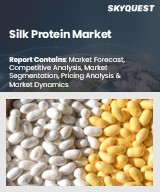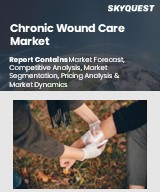
|
시장보고서
상품코드
1513710
생분해성 드레싱 시장 : 산업 분석, 규모, 점유율, 성장, 동향, 예측(2024-2033년)Biodegradable Dressings Market: Global Industry Analysis, Size, Share, Growth, Trends, and Forecast, 2024-2033 |
||||||
Persistence Market Research는 생분해성 드레싱 시장에 대한 종합적인 보고서를 발표했습니다. 이 보고서는 시장 성장 촉진요인, 동향, 기회 및 과제를 포함한 중요한 시장 역학을 철저히 평가하고 시장 구조에 대한 자세한 통찰력을 제공합니다.
주요 인사이트
- 생분해성 드레싱 시장 규모(2024년) : 2억 2,030만 달러
- 예측 시장 가치(2033년) : 3억 820만 달러
- 세계 시장 성장률(CAGR 2024-2033년) : 3.8%
생분해성 드레싱 시장 : 조사 범위
생분해성 드레싱은 기존의 드레싱과 비교하여 환경적으로 지속 가능한 솔루션을 제공하며 상처 관리에 중요한 역할을 합니다. 이러한 드레싱 재료는 시간이 지남에 따라 자연스럽게 분해되므로 빈번한 드레싱 교환의 필요성을 줄이고 생태계에 미치는 영향을 최소화할 수 있습니다. 이 시장은 병원, 진료소, 재택치료의 현장에 대응해, 콜라겐 베이스, 알긴산염, 하이드로콜로이드 드레싱을 포함한 다양한 유형의 드레싱을 제공합니다.
시장 성장 촉진요인:
생분해성 드레싱 세계 시장은 당뇨병성 궤양과 욕창과 같은 만성 상처의 유병률이 증가하고 지속 가능한 건강 관리 관행에 대한 의식이 높아짐에 따라 견인되고 있습니다. 생물활성화합물이나 나노기술을 포함한 드레싱재의 기술 혁신은 치유 결과와 환자의 쾌적성을 높여 시장의 성장을 더욱 자극합니다. 또한 친환경 의료 제품에 대한 규제 당국의 지원과 지속 가능한 상처 케어 솔루션을 추진하는 이니셔티브도 시장 확대에 기여하고 있습니다.
시장 성장 억제요인:
유망한 성장이 예상되는 반면, 생분해성 드레싱 시장은 기존의 드레싱과 비교했을 때의 비용 대비 효과와 상처 유형에 의한 성능의 편차 등의 과제에 직면하고 있습니다. 또한 지역에 따라서는 선진적인 상처 케어 제품에 대한 상환 범위가 한정되어 있기 때문에 특히 의료 예산에 제약이 있는 신흥 경제 국가에서는 시장 침투 장벽이 되고 있습니다.
시장 기회:
생분해성 드레싱 시장은 상처 치유 재료의 기술적 진보와 지속 가능한 건강 관리 옵션에 대한 환자의 선호도 증가로 큰 비즈니스 기회를 제공합니다. 신흥 시장 개척, 건강 관리 제공업체와의 전략적 제휴, R&D 투자는 역동적인 상처 치료 동향에서 경쟁 우위를 유지하는 데 필수적입니다.
이 보고서에서 다루는 주요 질문
- 세계 생분해성 드레싱 시장의 성장을 가속하는 주요 요인은?
- 생분해성 드레싱의 유형과 용도는 어떤 헬스케어 환경에서의 채용을 촉진하고 있는가?
- 기술 혁신은 생분해성 드레싱 시장 경쟁 구도를 어떻게 바꾸고 있는가?
- 생분해성 드레싱 시장에 기여하는 주요 기업은 어딘가, 그리고 시장의 관련성을 유지하기 위해 어떤 전략을 채택하고 있는가?
- 세계의 생분해성 드레싱 시장의 새로운 동향과 전망은?
목차
제1장 주요 요약
제2장 시장 개요
- 시장 범위/분류
- 시장의 정의/범위/제한
- 포함과 제외
제3장 주요 시장 동향
- 시장에 영향을 주는 주요 동향
- 제품 혁신/개발 동향
제4장 주요 성공 요인
- 제품 채용 분석
- 최근 제품 승인/발매
- 제조업체별 주요 프로모션 전략
- 공급망 분석
- Porter's Five Forces 분석
- 규제의 역학
제5장 시장 배경
- 거시경제 요인
- 예측 요인 - 관련성과 영향
- 시장 역학
제6장 COVID-19 위기 분석
- COVID-19와 영향 분석
- 제품별 수익
- 최종 사용자별 수익
- 국가별 수익
- 2024년 시장 시나리오
제7장 세계의 생분해성 드레싱 시장 수요 분석
- 과거 시장 가치 분석, 2019-2023년
- 현재 및 장래 시장 가치 예측, 2024-2033년
- 전년대비 성장 동향 분석
- 절대액의 기회 분석
제8장 세계의 생분해성 드레싱 시장 분석 : 제품별
- 소개/주요 조사 결과
- 과거 시장 규모 분석 : 제품별, 2019-2023년
- 현재 및 장래 시장 규모의 분석과 예측 : 제품별, 2024-2033년
- 폴리비닐알코올(PVA) 폼
- 히알루론산
- 카르복시메틸셀룰로오스
- 피브린 접착제
- 미세 기공 다당류 반구
- 키토산
- 제품별 시장의 매력 분석
제9장 세계의 생분해성 드레싱 시장 분석 : 최종 사용자별
- 소개/주요 조사 결과
- 과거 시장 규모 분석 : 최종 사용자별, 2019-2023년
- 현재 및 장래 시장 규모 분석과 예측 : 최종 사용자별, 2024-2033년
- 병원
- 클리닉
- 외래수술센터(ASC)
- 최종 사용자별 시장의 매력 분석
제10장 세계의 생분해성 드레싱 시장 분석 : 지역별
- 소개
- 과거 시장 규모 분석 : 지역별, 2019-2023년
- 현재 시장 규모 분석과 예측 :지역별, 2024-2033년
- 북미
- 라틴아메리카
- 유럽
- 남아시아
- 동아시아
- 오세아니아
- 중동 및 아프리카
- 지역별 시장의 매력 분석
제11장 북미의 생분해성 드레싱 시장 분석
제12장 라틴아메리카의 생분해성 드레싱 시장 분석
제13장 유럽의 생분해성 드레싱 시장 분석
제14장 남아시아의 생분해성 드레싱 시장 분석
제15장 동아시아의 생분해성 드레싱 시장 분석
제16장 오세아니아의 생분해성 드레싱 시장 분석
제17장 중동 및 아프리카의 생분해성 드레싱 시장 분석
제18장 시장 구조 분석
- 기업계층별 시장 분석
- 시장 집중
- 주요 기업의 시장 점유율 분석
- 시장현재분석
제19장 경쟁 분석
- 경쟁 대시보드
- 경쟁의 상세
- Aegis Lifesciences Pvt Ltd.
- Medtronic
- Datt Mediproducts Pvt Ltd.
- Stryker
- Huizhou Foryou Medical Devices Co, Ltd
- BenQ Materials Corp
- EON Meditech Pvt Ltd
- Divine Medicure Technology
- Axio Biosolutions Pvt. Ltd.
- Cenefom Corp.
- Smith-Nephew
- Baxter
- Reliance Life Sciences
- Hangzhou Singclean Medical Product Co. Ltd.
제20장 전제와 약어
제21장 조사 방법
JHS 24.07.26Persistence Market Research has recently released a comprehensive report on the Biodegradable Dressings Market. The report offers a thorough assessment of crucial market dynamics, including drivers, trends, opportunities, and challenges, providing detailed insights into the market structure.
Key Insights:
- Biodegradable Dressings Market Size (2024E): USD 220.3 million
- Projected Market Value (2033F): USD 308.2 million
- Global Market Growth Rate (CAGR 2024 to 2033): 3.8%
Biodegradable Dressings Market - Report Scope:
Biodegradable dressings play a critical role in wound care management, offering environmentally sustainable solutions compared to traditional dressings. These dressings degrade naturally over time, reducing the need for frequent dressing changes and minimizing ecological impact. The market caters to hospitals, clinics, and homecare settings, providing a variety of dressing types, including collagen-based, alginate, and hydrocolloid dressings.
Market Growth Drivers:
The global biodegradable dressings market is driven by increasing prevalence of chronic wounds, such as diabetic ulcers and pressure ulcers, coupled with rising awareness about sustainable healthcare practices. Innovations in dressing materials, including bioactive compounds and nanotechnology, enhance healing outcomes and patient comfort, further stimulating market growth. Additionally, regulatory support for eco-friendly healthcare products and initiatives promoting sustainable wound care solutions contribute to market expansion.
Market Restraints:
Despite promising growth prospects, the biodegradable dressings market faces challenges related to cost-effectiveness compared to conventional dressings and variability in performance across different wound types. Limited reimbursement coverage for advanced wound care products in certain regions also poses barriers to market penetration, particularly in developing economies with constrained healthcare budgets.
Market Opportunities:
The biodegradable dressings market presents significant opportunities driven by technological advancements in wound healing materials and growing patient preference for sustainable healthcare options. Expansion into emerging markets, strategic collaborations with healthcare providers, and investment in research and development are essential to capitalize on evolving trends and sustain competitive advantage in the dynamic wound care landscape.
Key Questions Answered in the Report:
- What are the primary factors driving the growth of the biodegradable dressings market globally?
- Which types of biodegradable dressings and applications are driving adoption across different healthcare settings?
- How are technological innovations reshaping the competitive landscape of the biodegradable dressings market?
- Who are the key players contributing to the biodegradable dressings market, and what strategies are they employing to maintain market relevance?
- What are the emerging trends and future prospects in the global biodegradable dressings market?
Competitive Intelligence and Business Strategy:
Leading players in the global biodegradable dressings market, including Medtronic, Stryker, and Baxter, focus on innovation, sustainability, and strategic partnerships to gain a competitive edge. These companies invest in R&D to develop advanced dressing materials, conduct clinical trials to validate performance, and collaborate with healthcare providers to enhance product adoption. Moreover, emphasis on regulatory compliance, product quality, and patient education fosters market growth and improves wound care outcomes in the evolving biodegradable dressings landscape.
Key Companies Profiled:
- Aegis Lifesciences Pvt Ltd.
- Medtronic
- Datt Mediproducts Pvt Ltd.
- Stryker
- Huizhou Foryou Medical Devices Co, Ltd
- BenQ Materials Corp
- EON Meditech Pvt Ltd
- Divine Medicure Technology
- Axio Biosolutions Pvt. Ltd.
- Cenefom Corp.
- Smith - Nephew
- Baxter
- Reliance Life Sciences
- Hangzhou Singclean Medical Product Co. Ltd.
Key Segments Covered in Biodegradable Dressings Industry Research
Product:
- Polyvinyl Alcohol (PVA) Foam
- Hyaluronic Acid
- Carboxymethyl Cellulose
- Fibrin Glue
- Microporous Polysaccharide Hemisphere
- Chitosan
End User
- Hospitals
- Clinics
- Ambulatory Surgical Centres
Region:
- North America
- Latin America
- Europe
- South Asia
- East Asia
- Oceania
- Middle East & Africa
Table of Contents
1. Executive Summary
- 1.1. Global Market Outlook
- 1.2. Demand Side Trends
- 1.3. Supply Side Trends
- 1.4. Analysis and Recommendations
2. Market Overview
- 2.1. Market Coverage / Taxonomy
- 2.2. Market Definition / Scope / Limitations
- 2.3. Inclusion and Exclusions
3. Key Market Trends
- 3.1. Key Trends Impacting the Market
- 3.2. Product Innovation / Development Trends
4. Key Success Factors
- 4.1. Product Adoption Analysis
- 4.2. Recent Product Approvals/ Launches
- 4.3. Key Promotional Strategies, By Manufacturers
- 4.4. Supply Chain Analysis
- 4.5. Porter's Five Forces Analysis
- 4.6. Regulatory Dynamics
5. Market Background
- 5.1. Macro-Economic Factors
- 5.1.1. Global GDP Growth Outlook
- 5.1.2. Global Healthcare Expenditure Overview
- 5.1.3. Global Advanced Wound Care Market Outlook
- 5.2. Forecast Factors - Relevance & Impact
- 5.2.1. Rising accidental cases
- 5.2.2. New development for patient care
- 5.2.3. Increasing number of surgeries
- 5.2.4. Rise in geriatric population
- 5.2.5. Increasing chronic conditions
- 5.3. Market Dynamics
- 5.3.1. Drivers
- 5.3.2. Restraints
- 5.3.3. Opportunity Analysis
6. COVID-19 Crisis Analysis
- 6.1. COVID-19 and Impact Analysis
- 6.1.1. Revenue by Product
- 6.1.2. Revenue by End User
- 6.1.3. Revenue by Country
- 6.2. 2024 Market Scenario
7. Global Biodegradable Dressings Market Demand (Size in US$ Mn) Analysis 2019-2023 and Forecast, 2024-2033
- 7.1. Historical Market Value (US$ Mn) Analysis, 2019-2023
- 7.2. Current and Future Market Value (US$ Mn) Projections, 2024-2033
- 7.2.1. Y-o-Y Growth Trend Analysis
- 7.2.2. Absolute $ Opportunity Analysis
8. Global Biodegradable Dressings Market Analysis 2019-2023 and Forecast 2024-2033, By Product
- 8.1. Introduction / Key Findings
- 8.2. Historical Market Size (In Value or Size in US$ Mn) Analysis by Product, 2019-2023
- 8.3. Current and Future Market Size (In Value or Size in US$ Mn) Analysis and Forecast by Product, 2024-2033
- 8.3.1. Polyvinyl Alcohol (PVA) Foam
- 8.3.2. Hyaluronic Acid
- 8.3.3. Carboxymethyl Cellulose
- 8.3.4. Fibrin Glue
- 8.3.5. Microporous Polysaccharide Hemisphere
- 8.3.6. Chitosan
- 8.4. Market Attractiveness Analysis by Product
9. Global Biodegradable Dressings Market Analysis 2019-2023 and Forecast 2024-2033, By End User
- 9.1. Introduction / Key Findings
- 9.2. Historical Market Size (In Value or Size in US$ Mn) Analysis by End User, 2019-2023
- 9.3. Current and Future Market Size (In Value or Size in US$ Mn) Analysis and Forecast by End User, 2024-2033
- 9.3.1. Hospitals
- 9.3.2. Clinics
- 9.3.3. Ambulatory Surgical Centres
- 9.4. Market Attractiveness Analysis by End User
10. Global Biodegradable Dressings Market Analysis 2019-2023 and Forecast 2024-2033, by Region
- 10.1. Introduction
- 10.2. Historical Market Size (In Value or Size in US$ Mn) Analysis by Region, 2019-2023
- 10.3. Current Market Size (In Value or Size in US$ Mn) Analysis and Forecast by Region, 2024-2033
- 10.3.1. North America
- 10.3.2. Latin America
- 10.3.3. Europe
- 10.3.4. South Asia
- 10.3.5. East Asia
- 10.3.6. Oceania
- 10.3.7. Middle East and Africa (MEA)
- 10.4. Market Attractiveness Analysis by Region
11. North America Biodegradable Dressings Market Analysis 2019-2023 and Forecast 2024-2033
- 11.1. Introduction
- 11.2. Historical Market Size (In Value or Size in US$ Mn) Trend Analysis by Market Taxonomy, 2019-2023
- 11.3. Current and Future Market Size (In Value or Size in US$ Mn) Analysis and Forecast by Market Taxonomy, 2024-2033
- 11.3.1. By Country
- 11.3.1.1. U.S.
- 11.3.1.2. Canada
- 11.3.2. By Product
- 11.3.3. By End User
- 11.3.1. By Country
- 11.4. Market Attractiveness Analysis
- 11.4.1. By Country
- 11.4.2. By Product
- 11.4.3. By End User
- 11.5. Market Trends
- 11.6. Key Market Participants - Intensity Mapping
- 11.7. Drivers and Restraints - Impact Analysis
- 11.8. Country Level Analysis & Forecast
- 11.8.1. U.S Biodegradable Dressings Market Analysis
- 11.8.1.1. Introduction
- 11.8.1.2. Market Analysis and Forecast by Market Taxonomy
- 11.8.1.2.1. By Product
- 11.8.1.2.2. By End User
- 11.8.2. Canada Biodegradable Dressings Market Analysis
- 11.8.2.1. Introduction
- 11.8.2.2. Market Analysis and Forecast by Market Taxonomy
- 11.8.2.2.1. By Product
- 11.8.2.2.2. By End User
- 11.8.1. U.S Biodegradable Dressings Market Analysis
12. Latin America Biodegradable Dressings Market Analysis 2019-2023 and Forecast 2024-2033
- 12.1. Introduction
- 12.2. Historical Market Size (In Value or Size in US$ Mn) Trend Analysis by Market Taxonomy, 2019-2023
- 12.3. Current and Future Market Size (In Value or Size in US$ Mn) Analysis and Forecast by Market Taxonomy, 2024-2033
- 12.3.1. By Country
- 12.3.1.1. Brazil
- 12.3.1.2. Mexico
- 12.3.1.3. Argentina
- 12.3.1.4. Rest of Latin America
- 12.3.2. By Product
- 12.3.3. By End User
- 12.3.1. By Country
- 12.4. Market Attractiveness Analysis
- 12.4.1. By Country
- 12.4.2. By Product
- 12.4.3. By End User
- 12.5. Market Trends
- 12.6. Key Market Participants - Intensity Mapping
- 12.7. Drivers and Restraints - Impact Analysis
- 12.8. Country Level Analysis & Forecast
- 12.8.1. Brazil Biodegradable Dressings Market Analysis
- 12.8.1.1. Introduction
- 12.8.1.2. Market Analysis and Forecast by Market Taxonomy
- 12.8.1.2.1. By Product
- 12.8.1.2.2. By End User
- 12.8.2. Mexico Biodegradable Dressings Market Analysis
- 12.8.2.1. Introduction
- 12.8.2.2. Market Analysis and Forecast by Market Taxonomy
- 12.8.2.2.1. By Product
- 12.8.2.2.2. By End User
- 12.8.3. Argentina Biodegradable Dressings Market Analysis
- 12.8.3.1. Introduction
- 12.8.3.2. Market Analysis and Forecast by Market Taxonomy
- 12.8.3.2.1. By Product
- 12.8.3.2.2. By End User
- 12.8.1. Brazil Biodegradable Dressings Market Analysis
13. Europe Biodegradable Dressings Market Analysis 2019-2023 and Forecast 2024-2033
- 13.1. Introduction
- 13.2. Historical Market Size (In Value or Size in US$ Mn) Trend Analysis by Market Taxonomy, 2019-2023
- 13.3. Current and Future Market Size (In Value or Size in US$ Mn) Analysis and Forecast by Market Taxonomy, 2024-2033
- 13.3.1. By Country
- 13.3.1.1. Germany
- 13.3.1.2. UK
- 13.3.1.3. France
- 13.3.1.4. Italy
- 13.3.1.5. Russia
- 13.3.1.6. Spain
- 13.3.1.7. BENELUX
- 13.3.1.8. Rest of Europe
- 13.3.2. By Product
- 13.3.3. By End User
- 13.3.1. By Country
- 13.4. Market Attractiveness Analysis
- 13.4.1. By Country
- 13.4.2. By Product
- 13.4.3. By End User
- 13.5. Market Trends
- 13.6. Key Market Participants - Intensity Mapping
- 13.7. Drivers and Restraints - Impact Analysis
- 13.8. Country Level Analysis & Forecast
- 13.8.1. Germany Biodegradable Dressings Market Analysis
- 13.8.1.1. Introduction
- 13.8.1.2. Market Analysis and Forecast by Market Taxonomy
- 13.8.1.2.1. By Product
- 13.8.1.2.2. By End User
- 13.8.2. UK Biodegradable Dressings Market Analysis
- 13.8.2.1. Introduction
- 13.8.2.2. Market Analysis and Forecast by Market Taxonomy
- 13.8.2.2.1. By Product
- 13.8.2.2.2. By End User
- 13.8.3. Russia Biodegradable Dressings Market Analysis
- 13.8.3.1. Introduction
- 13.8.3.2. Market Analysis and Forecast by Market Taxonomy
- 13.8.3.2.1. By Product
- 13.8.3.2.2. By End User
- 13.8.4. Spain Biodegradable Dressings Market Analysis
- 13.8.4.1. Introduction
- 13.8.4.2. Market Analysis and Forecast by Market Taxonomy
- 13.8.4.2.1. By Product
- 13.8.4.2.2. By End User
- 13.8.5. France Biodegradable Dressings Market Analysis
- 13.8.5.1. Introduction
- 13.8.5.2. Market Analysis and Forecast by Market Taxonomy
- 13.8.5.2.1. By Product
- 13.8.5.2.2. By End User
- 13.8.6. Italy Biodegradable Dressings Market Analysis
- 13.8.6.1. Introduction
- 13.8.6.2. Market Analysis and Forecast by Market Taxonomy
- 13.8.6.2.1. By Product
- 13.8.6.2.2. By End User
- 13.8.7. BENELUX Biodegradable Dressings Market Analysis
- 13.8.7.1. Introduction
- 13.8.7.2. Market Analysis and Forecast by Market Taxonomy
- 13.8.7.2.1. By Product
- 13.8.7.2.2. By End User
- 13.8.1. Germany Biodegradable Dressings Market Analysis
14. South Asia Biodegradable Dressings Market Analysis 2019-2023 and Forecast 2024-2033
- 14.1. Introduction
- 14.2. Historical Market Size (In Value or Size in US$ Mn) Trend Analysis by Market Taxonomy, 2019-2023
- 14.3. Current and Future Market Size (In Value or Size in US$ Mn) Analysis and Forecast by Market Taxonomy, 2024-2033
- 14.3.1. By Country
- 14.3.1.1. India
- 14.3.1.2. Indonesia
- 14.3.1.3. Malaysia
- 14.3.1.4. Thailand
- 14.3.1.5. Rest of South Asia
- 14.3.2. By Product
- 14.3.3. By End User
- 14.3.1. By Country
- 14.4. Market Attractiveness Analysis
- 14.4.1. By Country
- 14.4.2. By Product
- 14.4.3. By End User
- 14.5. Market Trends
- 14.6. Key Market Participants - Intensity Mapping
- 14.7. Drivers and Restraints - Impact Analysis
- 14.8. Country Level Analysis & Forecast
- 14.8.1. India Biodegradable Dressings Market Analysis
- 14.8.1.1. Introduction
- 14.8.1.2. Market Analysis and Forecast by Market Taxonomy
- 14.8.1.2.1. By Product
- 14.8.1.2.2. By End User
- 14.8.2. Indonesia Biodegradable Dressings Market Analysis
- 14.8.2.1. Introduction
- 14.8.2.2. Market Analysis and Forecast by Market Taxonomy
- 14.8.2.2.1. By Product
- 14.8.2.2.2. By End User
- 14.8.3. Malaysia Biodegradable Dressings Market Analysis
- 14.8.3.1. Introduction
- 14.8.3.2. Market Analysis and Forecast by Market Taxonomy
- 14.8.3.2.1. By Product
- 14.8.3.2.2. By End User
- 14.8.4. Thailand Biodegradable Dressings Market Analysis
- 14.8.4.1. Introduction
- 14.8.4.2. Market Analysis and Forecast by Market Taxonomy
- 14.8.4.2.1. By Product
- 14.8.4.2.2. By End User
- 14.8.1. India Biodegradable Dressings Market Analysis
15. East Asia Biodegradable Dressings Market Analysis 2019-2023 and Forecast 2024-2033
- 15.1. Introduction
- 15.2. Historical Market Size (In Value or Size in US$ Mn) Trend Analysis by Market Taxonomy, 2019-2023
- 15.3. Current and Future Market Size (In Value or Size in US$ Mn) Analysis and Forecast by Market Taxonomy, 2024-2033
- 15.3.1. By Country
- 15.3.1.1. China
- 15.3.1.2. Japan
- 15.3.1.3. South Korea
- 15.3.2. By Product
- 15.3.3. By End User
- 15.3.1. By Country
- 15.4. Market Attractiveness Analysis
- 15.4.1. By Country
- 15.4.2. By Product
- 15.4.3. By End User
- 15.5. Market Trends
- 15.6. Key Market Participants - Intensity Mapping
- 15.7. Drivers and Restraints - Impact Analysis
- 15.8. Country Level Analysis & Forecast
- 15.8.1. China Biodegradable Dressings Market Analysis
- 15.8.1.1. Introduction
- 15.8.1.2. Market Analysis and Forecast by Market Taxonomy
- 15.8.1.2.1. By Product
- 15.8.1.2.2. By End User
- 15.8.2. Japan Biodegradable Dressings Market Analysis
- 15.8.2.1. Introduction
- 15.8.2.2. Market Analysis and Forecast by Market Taxonomy
- 15.8.2.2.1. By Product
- 15.8.2.2.2. By End User
- 15.8.3. South Korea Biodegradable Dressings Market Analysis
- 15.8.3.1. Introduction
- 15.8.3.2. Market Analysis and Forecast by Market Taxonomy
- 15.8.3.2.1. By Product
- 15.8.3.2.2. By End User
- 15.8.1. China Biodegradable Dressings Market Analysis
16. Oceania Biodegradable Dressings Market Analysis 2019-2023 and Forecast 2024-2033
- 16.1. Introduction
- 16.2. Historical Market Size (In Value or Size in US$ Mn) Trend Analysis by Market Taxonomy, 2019-2023
- 16.3. Current and Future Market Size (In Value or Size in US$ Mn) Analysis and Forecast by Market Taxonomy, 2024-2033
- 16.3.1. By Country
- 16.3.1.1. Australia
- 16.3.1.2. New Zealand
- 16.3.2. By Product
- 16.3.3. By End User
- 16.3.1. By Country
- 16.4. Market Attractiveness Analysis
- 16.4.1. By Country
- 16.4.2. By Product
- 16.4.3. By End User
- 16.5. Market Trends
- 16.6. Key Market Participants - Intensity Mapping
- 16.7. Drivers and Restraints - Impact Analysis
- 16.8. Country Level Analysis & Forecast
- 16.8.1. Australia Biodegradable Dressings Market Analysis
- 16.8.1.1. Introduction
- 16.8.1.2. Market Analysis and Forecast by Market Taxonomy
- 16.8.1.2.1. By Product
- 16.8.1.2.2. By End User
- 16.8.2. New Zealand Biodegradable Dressings Market Analysis
- 16.8.2.1. Introduction
- 16.8.2.2. Market Analysis and Forecast by Market Taxonomy
- 16.8.2.2.1. By Product
- 16.8.2.2.2. By End User
- 16.8.1. Australia Biodegradable Dressings Market Analysis
17. Middle East & Africa (MEA) Biodegradable Dressings Market Analysis 2019-2023 and Forecast 2024-2033
- 17.1. Introduction
- 17.2. Historical Market Size (In Value or Size in US$ Mn) Trend Analysis by Market Taxonomy, 2019-2023
- 17.3. Current and Future Market Size (In Value or Size in US$ Mn) Analysis and Forecast by Market Taxonomy, 2024-2033
- 17.3.1. By Country
- 17.3.1.1. GCC Countries
- 17.3.1.2. Turkey
- 17.3.1.3. South Africa
- 17.3.1.4. North Africa
- 17.3.1.5. Rest of MEA
- 17.3.2. By Product
- 17.3.3. By End User
- 17.3.1. By Country
- 17.4. Market Attractiveness Analysis
- 17.4.1. By Country
- 17.4.2. By Product
- 17.4.3. By End User
- 17.5. Market Trends
- 17.6. Key Market Participants - Intensity Mapping
- 17.7. Drivers and Restraints - Impact Analysis
- 17.8. Country Level Analysis & Forecast
- 17.8.1. GCC Countries Biodegradable Dressings Market Analysis
- 17.8.1.1. Introduction
- 17.8.1.2. Market Analysis and Forecast by Market Taxonomy
- 17.8.1.2.1. By Product
- 17.8.1.2.2. By End User
- 17.8.2. Turkey Biodegradable Dressings Market Analysis
- 17.8.2.1. Introduction
- 17.8.2.2. Market Analysis and Forecast by Market Taxonomy
- 17.8.2.2.1. By Product
- 17.8.2.2.2. By End User
- 17.8.3. South Africa Biodegradable Dressings Market Analysis
- 17.8.3.1. Introduction
- 17.8.3.2. Market Analysis and Forecast by Market Taxonomy
- 17.8.3.2.1. By Product
- 17.8.3.2.2. By End User
- 17.8.4. North Africa Biodegradable Dressings Market Analysis
- 17.8.4.1. Introduction
- 17.8.4.2. Market Analysis and Forecast by Market Taxonomy
- 17.8.4.2.1. By Product
- 17.8.4.2.2. By End User
- 17.8.1. GCC Countries Biodegradable Dressings Market Analysis
18. Market Structure Analysis
- 18.1. Market Analysis by Tier of Companies
- 18.2. Market Concentration
- 18.3. Market Share Analysis of Top Players
- 18.4. Market Presence Analysis
- 18.4.1. Regional footprint of Players
- 18.4.2. Product foot print by Players
- 18.4.3. Channel Foot Print by Players
19. Competition Analysis
- 19.1. Competition Dashboard
- 19.2. Competition Deep Dive
- 19.2.1. Aegis Lifesciences Pvt Ltd.
- 19.2.1.1. Overview
- 19.2.1.2. Product Portfolio
- 19.2.1.3. Key Financials
- 19.2.1.4. Sales Footprint
- 19.2.1.5. SWOT Analysis
- 19.2.1.6. Strategy Overview
- 19.2.1.6.1. Marketing Strategy
- 19.2.1.6.2. Product Strategy
- 19.2.1.6.3. Channel Strategy
- 19.2.2. Medtronic
- 19.2.2.1. Overview
- 19.2.2.2. Product Portfolio
- 19.2.2.3. Key Financials
- 19.2.2.4. Sales Footprint
- 19.2.2.5. SWOT Analysis
- 19.2.2.6. Strategy Overview
- 19.2.2.6.1. Marketing Strategy
- 19.2.2.6.2. Product Strategy
- 19.2.2.6.3. Channel Strategy
- 19.2.3. Datt Mediproducts Pvt Ltd.
- 19.2.3.1. Overview
- 19.2.3.2. Product Portfolio
- 19.2.3.3. Key Financials
- 19.2.3.4. Sales Footprint
- 19.2.3.5. SWOT Analysis
- 19.2.3.6. Strategy Overview
- 19.2.3.6.1. Marketing Strategy
- 19.2.3.6.2. Product Strategy
- 19.2.3.6.3. Channel Strategy
- 19.2.4. Stryker
- 19.2.4.1. Overview
- 19.2.4.2. Product Portfolio
- 19.2.4.3. Key Financials
- 19.2.4.4. Sales Footprint
- 19.2.4.5. SWOT Analysis
- 19.2.4.6. Strategy Overview
- 19.2.4.6.1. Marketing Strategy
- 19.2.4.6.2. Product Strategy
- 19.2.4.6.3. Channel Strategy
- 19.2.5. Huizhou Foryou Medical Devices Co, Ltd
- 19.2.5.1. Overview
- 19.2.5.2. Product Portfolio
- 19.2.5.3. Key Financials
- 19.2.5.4. Sales Footprint
- 19.2.5.5. SWOT Analysis
- 19.2.5.6. Strategy Overview
- 19.2.5.6.1. Marketing Strategy
- 19.2.5.6.2. Product Strategy
- 19.2.5.6.3. Channel Strategy
- 19.2.6. BenQ Materials Corp
- 19.2.6.1. Overview
- 19.2.6.2. Product Portfolio
- 19.2.6.3. Key Financials
- 19.2.6.4. Sales Footprint
- 19.2.6.5. SWOT Analysis
- 19.2.6.6. Strategy Overview
- 19.2.6.6.1. Marketing Strategy
- 19.2.6.6.2. Product Strategy
- 19.2.6.6.3. Channel Strategy
- 19.2.7. EON Meditech Pvt Ltd
- 19.2.7.1. Overview
- 19.2.7.2. Product Portfolio
- 19.2.7.3. Key Financials
- 19.2.7.4. Sales Footprint
- 19.2.7.5. SWOT Analysis
- 19.2.7.6. Strategy Overview
- 19.2.7.6.1. Marketing Strategy
- 19.2.7.6.2. Product Strategy
- 19.2.7.6.3. Channel Strategy
- 19.2.8. Divine Medicure Technology
- 19.2.8.1. Overview
- 19.2.8.2. Product Portfolio
- 19.2.8.3. Key Financials
- 19.2.8.4. Sales Footprint
- 19.2.8.5. SWOT Analysis
- 19.2.8.6. Strategy Overview
- 19.2.8.6.1. Marketing Strategy
- 19.2.8.6.2. Product Strategy
- 19.2.8.6.3. Channel Strategy
- 19.2.9. Axio Biosolutions Pvt. Ltd.
- 19.2.9.1. Overview
- 19.2.9.2. Product Portfolio
- 19.2.9.3. Key Financials
- 19.2.9.4. Sales Footprint
- 19.2.9.5. SWOT Analysis
- 19.2.9.6. Strategy Overview
- 19.2.9.6.1. Marketing Strategy
- 19.2.9.6.2. Product Strategy
- 19.2.9.6.3. Channel Strategy
- 19.2.10. Cenefom Corp.
- 19.2.10.1. Overview
- 19.2.10.2. Product Portfolio
- 19.2.10.3. Key Financials
- 19.2.10.4. Sales Footprint
- 19.2.10.5. SWOT Analysis
- 19.2.10.6. Strategy Overview
- 19.2.10.6.1. Marketing Strategy
- 19.2.10.6.2. Product Strategy
- 19.2.10.6.3. Channel Strategy
- 19.2.11. Smith - Nephew
- 19.2.11.1. Overview
- 19.2.11.2. Product Portfolio
- 19.2.11.3. Key Financials
- 19.2.11.4. Sales Footprint
- 19.2.11.5. SWOT Analysis
- 19.2.11.6. Strategy Overview
- 19.2.11.6.1. Marketing Strategy
- 19.2.11.6.2. Product Strategy
- 19.2.11.6.3. Channel Strategy
- 19.2.12. Baxter
- 19.2.12.1. Overview
- 19.2.12.2. Product Portfolio
- 19.2.12.3. Key Financials
- 19.2.12.4. Sales Footprint
- 19.2.12.5. SWOT Analysis
- 19.2.12.6. Strategy Overview
- 19.2.12.6.1. Marketing Strategy
- 19.2.12.6.2. Product Strategy
- 19.2.12.6.3. Channel Strategy
- 19.2.13. Reliance Life Sciences
- 19.2.13.1. Overview
- 19.2.13.2. Product Portfolio
- 19.2.13.3. Key Financials
- 19.2.13.4. Sales Footprint
- 19.2.13.5. SWOT Analysis
- 19.2.13.6. Strategy Overview
- 19.2.13.6.1. Marketing Strategy
- 19.2.13.6.2. Product Strategy
- 19.2.13.6.3. Channel Strategy
- 19.2.14. Hangzhou Singclean Medical Product Co. Ltd.
- 19.2.14.1. Overview
- 19.2.14.2. Product Portfolio
- 19.2.14.3. Key Financials
- 19.2.14.4. Sales Footprint
- 19.2.14.5. SWOT Analysis
- 19.2.14.6. Strategy Overview
- 19.2.14.6.1. Marketing Strategy
- 19.2.14.6.2. Product Strategy
- 19.2.14.6.3. Channel Strategy
- 19.2.1. Aegis Lifesciences Pvt Ltd.



















